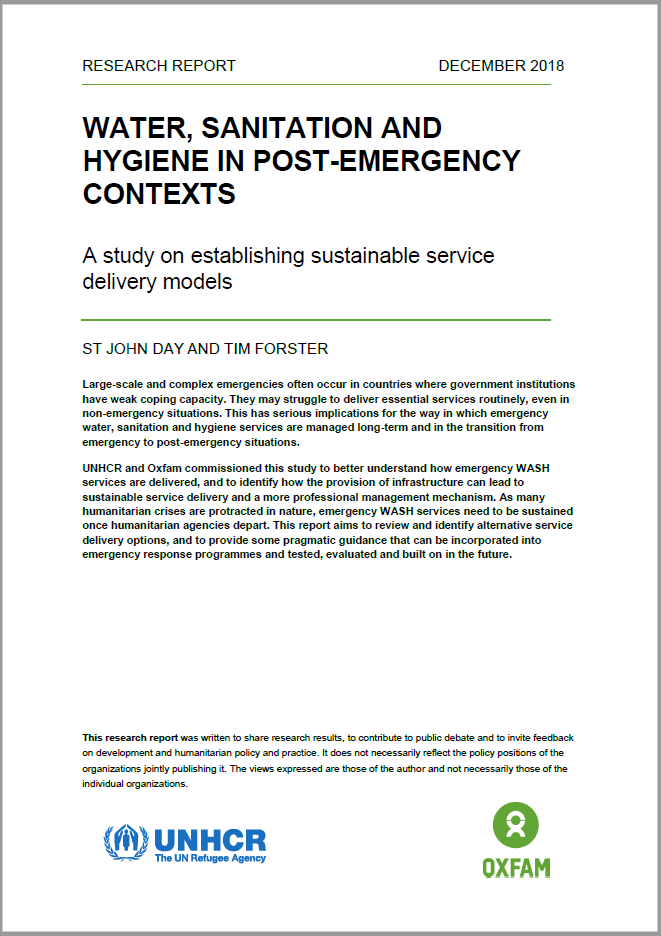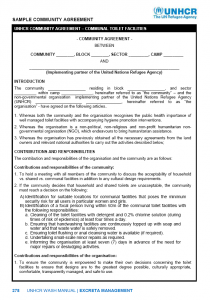
This document describes the objectives and underlying principles of WASH programming in the UNHCR Comprehensive Refugee Response Framework, including steps to be taken, and the role of UNHCR. Guidance is provided for all phases of the relief cycle from preparedness to long-term inclusion.

This water tanker checklist has been produced to help WASH actors inspect water hauling vehicles used in refugee operations. Please note that it is not a strict compliance document, but is intended to help select water tankers that are sanitary, safe, and legal. Ideally, every vehicle should be inspected before entering service. WASH programs may decide to issue vehicles that pass with a certificate of acceptability for the duration of the operation.

This logbook form should be used as part of the monitoring and payment justification process for water trucking in emergencies. The logbook should be kept by the refugee water monitor responsible for tracking water deliveries to the site and copies should be sent to UNHCR on a weekly basis for monitoring purposes.

This logbook form should be used as part of the payment justification process for water trucking in emergencies. The logbook should be kept with the vehicle at all times for spot checks and copies should be sent to UNHCR on a weekly basis for monitoring purposes.

The Cost of Water Project supports the effective planning and sustainable management of water supply systems in refugee camps and settlements. Launched in 2014 by the Water, Sanitation and Hygiene (WASH) Unit in DPSM’s Public Health Section in partnership with the International Water and Sanitation Centre, the project measures the overall costs of providing effective water systems in a variety of refugee hosting contexts to create a flexible decision-making tool specific to refugee situations.

UNHCR and Oxfam commissioned this study to better understand how emergency WASH services are delivered, and to identify how the provision of infrastructure can lead to sustainable service delivery and a more professional management mechanism. As many humanitarian crises are protracted in nature, emergency WASH services need to be sustained once humanitarian agencies depart. This report aims to review and identify alternative service delivery options, and to provide some pragmatic guidance that can be incorporated into emergency response programmes and tested, evaluated and built on in the future.

This WASH Equipment Specifications Catalogue has been produced by UNHCR’s WASH and Procurement Departments to improve the acquisition and effective procurement of WASH relief items.
The catalogue includes specifications and quality requirements for standard WASH equipment items such as pumps, tapstands, water tanks and water testing equipment.

The UNHCR WASH Manual: Programme Guidance, provides practical guidance for WASH programmes in refugee settings.
Tags: Camp Closure, camp management, Child Friendly Facilities, Cold Climates, Disability, Environment, Gender, Gender Based Violence, Human Right to Water / Sanitation, Human Right to Water / Sanitation, Protection, Protection, Value for Money, Value for Money, WASH Coordination, WASH Coordination, WASH Monitoring, WASH Monitoring, WASH Programme Health and Safety, WASH Reporting, and WASH Reporting. Categories: WASH Manual.

This report is based on a desk-based review of secondary data, comprising published material as well as grey literature, supplemented with key informant interviews for programmes that lacked documentation. Section One summarises the current use of CBI in WASH programming. Section Two summarises the best practices and lessons learned including challenges faced, drawing on evidence from the project examples found. Section Three provides recommendations and best practice guidance for use of CBI in refugee settings. Section Four details existing tools and guidance.
Tags: Capacity Building, Capacity Building, CASH Interventions, CASH Interventions, WASH Assessments, WASH Assessments, WASH Strategy Development, WASH Strategy Development, WASH Strategy Development, and WASH Strategy Development. Languages: French. Categories: WASH Guidelines, WASH Operational Guidelines, WASH Operational Guidelines, WASH Operational Guidelines, WASH Policy Guidelines, WASH Policy Guidelines, WASH Policy Guidelines, WASH Policy Guidelines, WASH Research Documents, and WASH Research Documents.

This toilet block management sample community agreement can help define the responsibilities of the different stakeholders in operation and maintenance of WASH facilities from filling up the hand-washing water containers, and keeping the surroundings clean, to providing maintenance.
Tags: Communal Toilets, Cross Cutting, Cross Cutting, Cross Cutting, Cross Cutting, Excreta Management, Excreta Management, and Excreta Management. Languages: English, English, English, English, English, English, English, English, English, and English. Organisations: UNHCR, UNHCR, UNHCR, UNHCR, UNHCR, UNHCR, UNHCR, UNHCR, UNHCR, and UNHCR. Categories: WASH Blank Forms, WASH Blank Forms, WASH Blank Forms, WASH Blank Forms, WASH Reference Documents, WASH Reference Documents, WASH Reference Documents, WASH Reference Documents, WASH Reference Documents, WASH Reference Documents, WASH Reference Documents, WASH Reference Documents, and WASH Reference Documents.










